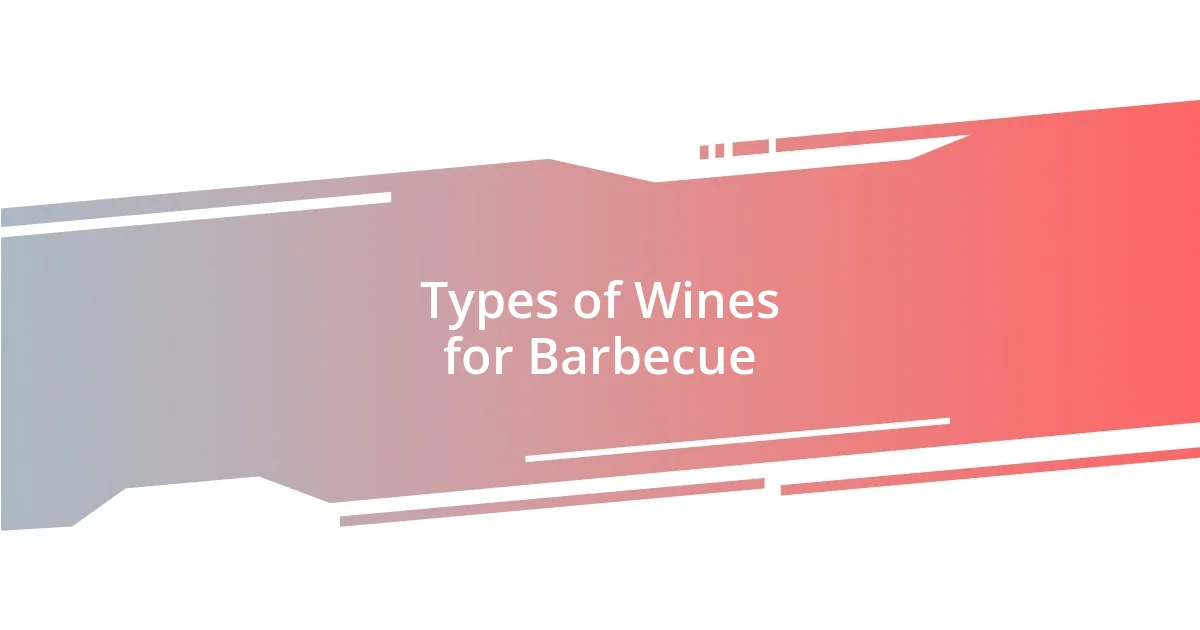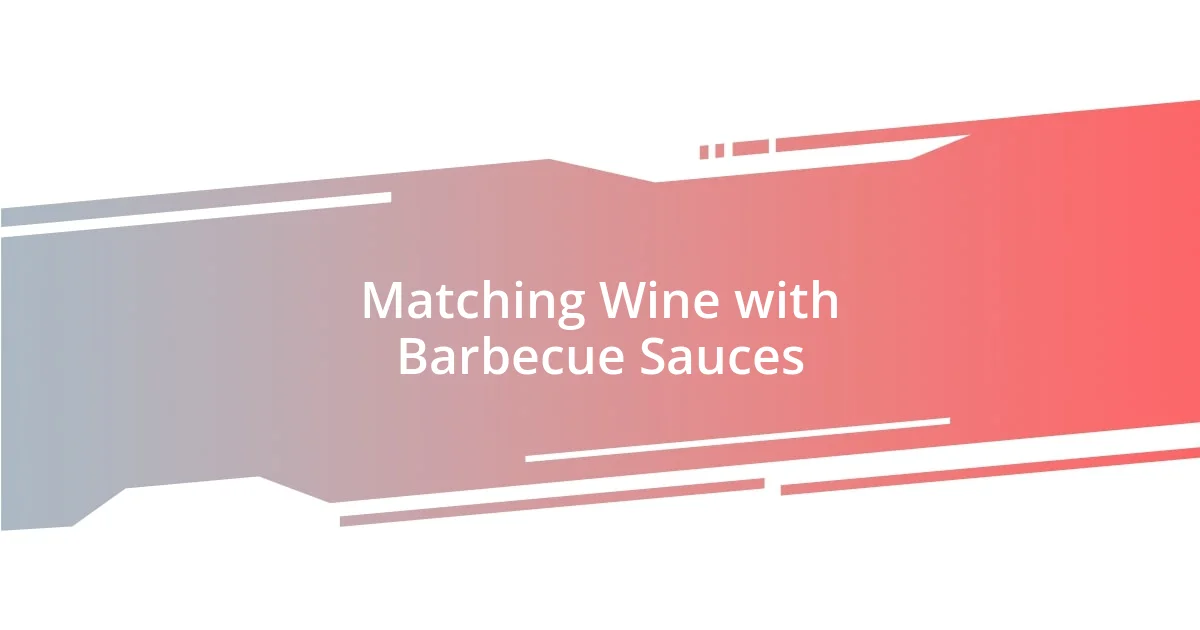Key takeaways:
- Understanding flavor profiles and pairing wines, like Zinfandel with smoky brisket or Sauvignon Blanc with grilled chicken, can elevate the dining experience.
- Choosing the right wine for specific grilled meats enhances each dish; for example, Cabernet Sauvignon pairs well with ribeye, while Chardonnay suits grilled fish.
- Experimenting with wine and barbecue sauces, such as pairing Riesling with sweet sauces or Syrah with smoky flavors, can create memorable culinary experiences.

Understanding Barbecue Wine Pairing
When it comes to barbecue wine pairing, the key is understanding the flavors at play. A rich, smoky grill can elevate the taste of food, making it essential to choose a wine that complements these bold flavors. I still remember the first time I paired a robust Zinfandel with a smoky barbecue brisket—it was a revelation! The wine’s jammy fruit and spicy notes danced with the meat’s richness in a way that completely changed my approach to pairing.
Many people wonder whether red or white wine is better for barbecue, and let me tell you, it really comes down to your personal taste and the specific dishes you’re serving. For instance, grilled chicken with a tangy marinade might shine when paired with a crisp Sauvignon Blanc, while a hearty ribeye needs something bolder. Can you feel the excitement of discovering how the right wine can transform your meal? That’s the beauty of it!
Moreover, it’s crucial to consider the seasonings used in your barbecue. A sweet barbecue sauce might need a wine with a hint of acidity to balance it out. Once, I poured a fruity Gamay to accompany some ribs slathered in a homemade sweet sauce. The acidity brightened each bite, creating a delightful harmony that made my dining experience unforgettable. Understanding these nuances not only enhances your meal but also adds a whole new layer of enjoyment to those backyard gatherings.

Types of Wines for Barbecue
When selecting a type of wine for your barbecue, consider the overall flavor profile of your meal. Personally, I find red wines to be the stars at most barbecues, but there’s a world of options out there. For robust meats, I often reach for full-bodied reds like Cabernet Sauvignon or Malbec. Their complexity really shines when paired with dishes such as grilled lamb or smoky ribs. I still recall the first time I grilled a marinated flank steak and opened a bottle of Shiraz—it was like their flavors were meant to be together.
On the white wine side, I’ve had some delightful surprises. If you’re grilling lighter fare, such as seafood or chicken, I suggest trying a white wine with both freshness and body. Here’s a quick list for you:
- Zinfandel: Excellent with grilled meats due to its fruitiness and spice.
- Shiraz: Perfect for smoky flavors, creating rich combinations.
- Sauvignon Blanc: Great for herbaceous chicken or seafood dishes.
- Chardonnay: A versatile choice, especially with buttery grilled veggies.
- Pinot Noir: Its light body pairs well with almost anything off the grill.
I once paired a buttery Chardonnay with grilled corn and chicken; the combination was simply sublime. Every sip enhanced the grilled char’s sweetness, making it a memorable evening. Choosing the right wine can elevate your barbecue meals in ways you might never have considered.

Choosing Wine for Grilled Meats
When it comes to choosing wine for grilled meats, I often reflect on the symphony of flavors involved. A powerful Malbec can take center stage against the backdrop of barbecued brisket, with its dark fruit and subtle spice playing a crucial role in balancing the meat’s fattiness. I still vividly recall a summer evening where I paired a smoky grilled turkey leg with a Zinfandel; the wine’s bold notes complemented the richness of the meat, resulting in a taste experience that lingered long after the meal was over.
I find that considering the cooking technique can also guide my wine choice. For instance, if I’m grilling something with a charred crust, I might lean towards a bolder red. A juicy ribeye grilled to perfection pairs beautifully with a Cabernet Sauvignon, whose tannins cut through the richness of the beef. Meanwhile, if I’m opting for lighter cuts like grilled chicken, I frequently sway toward a refreshing Sauvignon Blanc. It adds a crispness that brightens the entire dish, reminiscent of an energetic picnic filled with laughter and good company.
To help in your decision-making process, here’s a simple comparison of wine options based on the type of grilled meat:
| Grilled Meat | Recommended Wine |
|---|---|
| Ribeye Steak | Cabernet Sauvignon |
| BBQ Chicken | Sauvignon Blanc |
| Grilled Lamb | Malbec |
| Smoked Ribs | Zinfandel |
| Grilled Fish | Chardonnay |

Matching Wine with Barbecue Sauces
When I think about matching wine with barbecue sauces, it’s a fascinating dance between flavors. Take a barbecue sauce that’s tangy and sweet; I often find that a light, fruity Riesling can meld beautifully with those notes. One summer evening, I glazed some grilled meats with a homemade peach barbecue sauce, and a chilled bottle of Riesling turned the whole meal into a vibrant experience—definitely a combo I’d go for again!
It’s also essential to consider the sauce’s smokiness. With a barbecue that features bold, smoky flavors, wines like Syrah or even a Spanish Garnacha can really enhance the experience. I remember setting up a barbecue where the sauce was rich and smoky, and I happened to pour a glass of Syrah. The wine’s peppery character mingled so well with the meat, almost like they were meant to find each other. Isn’t it amazing how certain combinations can evoke strong memories?
Now, I often ask myself: how do the subtleties in wine and sauce interact? For instance, a fiery, spicy sauce pairs beautifully with a slightly sweet wine like a fruity Grenache. There’s something magical about those contrasting flavors; the sweetness tempers the heat, creating a symphonic harmony. I’ve seen friends go from skeptical to pleasantly surprised when they taste such pairings, proving that experimenting with wine and barbecue sauces can lead to unforgettable culinary discoveries.

Secrets to Enhancing Flavor Profiles
One of my favorite secrets in enhancing flavor profiles is the art of seasoning the wine with complementary aromas. I learned this while hosting a barbecue where I decided to infuse my wine with fresh herbs, such as basil and rosemary. The result was incredible; every sip of the wine seemed to echo the herb-infused flavors appearing in the grilled veggies. Isn’t it fascinating how a simple touch can elevate both the wine and food experience?
Sometimes, I find it beneficial to consider the temperature of the wine. Serving reds slightly chilled can reveal hidden fruit notes that harmonize beautifully with richer barbecued meats. I remember the first time I chilled a bold Merlot and served it alongside some grilled sausages. This unexpected twist helped the wine maintain its integrity without overpowering the food. Have you ever thought about how wine temperature can shift flavor perception?
Lastly, I like to think about texture. Pairing a velvety wine with a dish that has a crispy texture can create a wonderful contrast. For example, pouring a silky Pinot Noir alongside crispy grilled asparagus not only enhances the experience but also brings out the natural sweetness in both the wine and the vegetables. It always amazes me how these small details can turn a good meal into a memorable one. What interesting contrasts have you discovered in your barbecue pairings?















